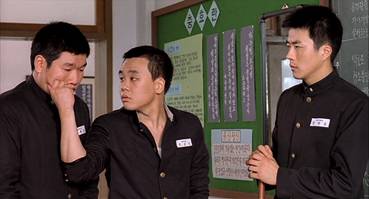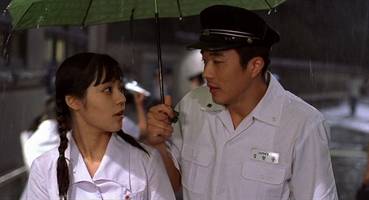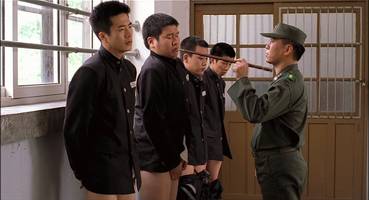|
It's
easy to be misled by film titles, and one like Once
Upon a Time in High School carries with it specific
connotations, first to the epic works of Sergio Leone,
and more specifically, given this film's Eastern origin,
to Tsui Hark's Once Upon a Time in China trilogy.
This connection is emphasised by a poster (and subsequent
DVD cover) featuring a uniformed young man in a kung-fu
stance. Oh, did I mention that the original title was The
Spirit of Jeet Kune Do? I'm sure there are few fans of martial arts cinema out there that need reminding that this was the martial
art system practiced by the late, great Bruce Lee. Take
another look at that cover. The school uniform the boy
is wearing could almost be mistaken for the collarless
jacket Bruce wore in Enter the Dragon.
But Once Upon a Time in High School is
no imitative Korean kung-fu knock-off, and despite
the important role martial arts takes in the story, is not
actually a martial arts film at all. Indeed, according to
internet sources, the actual translation of the Korean title
Maljukgeori janhoksa is 'Maljuk Street
High School'. Not quite as catchy, but at least true to
the storyline. (As it happens, were it not for the suggestive cinematic
lineage of the 'Once Upon a Time...' label, the film's present
title would work rather well.)
The
overall thrust of the story – a young man's rite of passage
through a difficult year at high school – may be familiar
stuff, but its location and period can't help but distance
it considerably from any number of Stateside takes on the subject. Certainly
the 1978 Korean high school here will bear little resemblance
to anything most Western (and even young Korean) audiences
will recognise. The authority of the teachers is
maintained through a cobination of verbal abuse and physical violence, while
punishments dished out for even the slightest disobedience
are on the level of those visited on the unfortunate Marine
recruits by Sergeant Hartman in Full Metal Jacket.
Fail to solve a mathematical problem at the required speed
and you'll be hit repeatedly with a stick, be improperly
dressed and it's a baseball bat to the buttocks, get
caught with pornography and you'll be paraded in your underpants,
prodded aggressively in the goolies and squat-marched down
the stairs. And that's just what the teachers dish out. There is also
the hierarchy of bullies to contend with, who inflict verbal humiliation and serious beatings of their own.

For
young Hyun-soo, these are hard but quickly learned lessons.
His family has just moved to the district and he has been transferred
to the Jungmoon High School, whose reputation as a problem
establishment is widely known. Even before he reaches
school on his very first day, he experiences a reality check on
the overcrowded school bus, as girls are harassed, smokers
hide their cigarettes in hollowed-out text books, and a senior
pupil demands that Hyun-soo hand over his uniform collar, whose absence
lands him in trouble even before he gets through the school
gate and earns him his first official beating. At the school,
he makes two very different and unlikely friends, the overweight
Hamburger, who sells porn to the other students to fund
his tuition, and Woo-sik, who shares with Hyun-soo a love of Bruce Lee
films, but unlike the newcomer has developed his own fighting
style. The real ray of light hits him on the
journey home when he first sees and instantly falls for
Eun-ju, a girl travelling on the same bus. Will he approach
her? Not very likely. Hyun-soo is terminally shy, something
his Tae Kwon Do instructor father aggressively berates him
for. "Nothing is impossible if you're determined,"
he tells him after knocking him over in a practice session.
"There's nothing you can't do if you focus."
The
touchstones here are familiar and the subsequent
narrative path would seem to be an obvious one – Hyun-soo
will overcome his shyness, beat the bullies, get the girl,
and become the man his father always wanted him to be. Well,
yes and no. Although some expected narrative arcs are followed,
the journey proves a fractured one and the course
of both love and friendship rarely runs smoothly. When Hyun-soo
sees Eun-ju being harassed by bullies on the school bus,
for example, he politely stands up for her and the pair
end up fleeing hand-in-hand and hiding from the pursuing
aggressors, the perfect opportunity for their inevitable
bonding. But when Eun-ju accidentally gives their hiding
place away, it is the more confident Woo-sik who arrives
to save the day and he who ends up dating Eun-ju. It is
typical of the film's ability to undermine the expected
that this relationship begins shortly after Hyun-soo believes
he has made his first, timid moves towards dating Eun-ju,
hanging around her school in the rain in the hope of faking
a chance meeting (in a nice touch he bottles out and walks
away, only to be spotted and pursued by her) and then sharing
an umbrella that he insists she keep. This symbolic gift
of affection becomes an almighty slap in the face when a
few days later it is returned to him by Woo-sik as a casual
announcement of his involvement with her.

The
rest of the story plays out in similar fashion, with the
expected presented in sometimes surprising ways. Martial
arts combat does play its role, but has a rough and ready playground
scrappiness to it, the only really devastating blow being
delivered by a girl Hyun-soo is reluctantly paired with
at a disco, a physical education instructor who stands up
to a bully and provides a demonstration of just what Tae
Kwon Do can do with a little practice. And when Hyun-soo finally,
inevitably, prepares for violent confrontation, the almost
stylised perfection of his training is undermined by the
haphazard brutality of the fight itself, effectively de-glamorising
kung-fu to the level of an angry, vicious brawl.
But
key to why Once Upon a Time in High School works so damned well is in its confidently charismatic performances
(In-kwon Kim as the explosive Stabber is particularly good)
and the skill with which the story is told. There is an
exuberance and brisk economy to director Ha Yu's storytelling that
is instantly engaging; in a few short opening minutes he introduces
us to the school, its reputation, its brutality, and many
of the main characters, all of whom are very clearly and
believably defined. Yu's way with narrative and scene structure is
bang on, timing the pain and rewards handed out to characters
to maximise our involvement with their plight in a way I've
rarely encountered in teen movies from the West. Indeed,
I would go as far as to say that I recognised more from
my own less-than-happy schooldays in this film than any
similarly set drama from either the UK or the US, and found
Hyun-soo's life experiences disarmingly easy to relate to.
Even the more idealised moments do not feel artificial or
forced, which is saying something given that Hyun-soo first
proves himself to his classmates through his skills on the
basketball court, almost a US teen movie cliché in
itself.
The
brutality dished out by the teachers here may seem a bit hard
to swallow for younger Western audiences, but older Korean
commentators have testified to the film's authenticity on
this score, and Hu Ya himself has admitted to drawing on
his own high school experiences. Although relieved I did
not attend such a school myself, I still took my share of
authority sanctioned beatings in a day when corporal punishment
was regarded as a legitimate method of student control. Except
that it didn't work – we didn't learn to behave, just not
to get caught misbehaving. It's a similar story here, as despite
the violence dished out to the students, they continue to
get poor grades, break the rules and bully their peers. Here violence breeds only violence,
and the one lesson that seems clear is that if you dish
it out for long enough, then sooner or later the recipient will
react and fight back. And he may just prove to be angrier,
more desperate and more determined than you.

The
verbal abuse handed out at Jungmoon also falls
on deaf ears, and a subject does not become easier to
understand because you are hit on the head while you do it. In a brief but telling later scene, a college class
is shown enjoying the process of studying and understanding
mathematics because it is taught with almost insane passion,
something that the students both comprehend and enthusiastically respond to. It's a touching and effective moment in a film that
is riddled with them. Don't be tricked by the title or the
DVD cover – this is an involving, intelligent and hugely
enjoyable high school drama that captures perfectly the
emotional battleground that school days can represent, and
deserves to find a far wider audience that it probably,
sadly will.
Premiere
Asia have once again delivered the goods with a very fine
anamorphic transfer that displays a very good level of detail, while the colour palette and contrast balance are close to perfect. Black levels are
fine throughout, and the print, as you'd expect of more
recent films, is pretty much spotless.
The
Dolby 5.1 soundtrack is bright and clear, though is mainly
front based, despite occasional (and sometimes very specific)
use of the rears.
The
subtitles should get a mention just for being UK specific
– at one point a teacher contemptuously refers to his class
as "stupid wankers."
Almost
all of the extras here appear to have been ported over from
a Korean DVD, so it's a real shame we don't get the cast
and crew commentary from the CJ Entertainment Korean special
edition. Ah well.
What
we do have is The World of the Supporting Role:
Interview with Supporting Cast Members (16:41),
in which members of the supporting cast talk about the characters
they play and their experiences on the film. The Korean
captions introducing the actors and characters are not translated,
but it's easy to recognise most of them. The twee backing
music is a bit much, but a common feature on Far East DVD
extras, and the interviews themselves are certainly engaging
enough.
Leaning again towards the martial arts thrust of the advertising
is A Martial Arts Textbook: Interview with Action
Director Shin Jae-myung (10:10). This is less enthralling,
with Jae-myung detailing the process of preparation for
the fight scenes, which is pretty much what you'd expect
it to be. It livens up a bit when he starts talking about
director Ha Yu, saying "sometimes I get confused, was
he a poet or a gangster?" and expressing concern about
the amount he smokes.
The
Promotional Gallery contains
two trailers, which are revealing in their respective approaches.
The UK Promotional Trailer, (1:49)
takes the martial arts angle to the limit, excluding just
about everything not action relation and really selling
the film as a kung fu beat-em-up. If you come to the film
based on this trailer you are in for BIG surprise. Far more
accurate is the Original Promotional Trailer
(1:56), which captures the mood and tone of the film very
nicely.
There
are six (actually seven – one is divided into two) Out-Takes
(12:49) of existing scenes. They're not particularly funny
or that different to the final versions, but they do emphasise
just how much actual physical punishment the young cast
had to do through in the process of making this film.
There
are also trailers for six other Premiere Asia releases.
It's
a shame that this film is being pushed so heavily as a martial
arts actioner, as it could too easily end up being missed
by the very audience that would most appreciate it, and
possibly even piss off hardened action fans looking for
a Korean Ong-Bak.
I would hope that those who do stumble across it through
promotional misdirection give it a go on its own terms,
as internet feedback suggests that when this has happened,
the response has been very positive. Others should ignore
the Bruce Lee pose on the DVD cover and check out this small
gem of modern Korean cinema, and one whose character and
experiences many will recognise as their own.
This
Premier Asia DVD doesn't exactly shine in the extras department
(I'd love to have that commentary), but the transfer is
first rate and that's good enough for me. Whether you chose
to buy or rent, do give the film a look. It may well surprise
you.
|